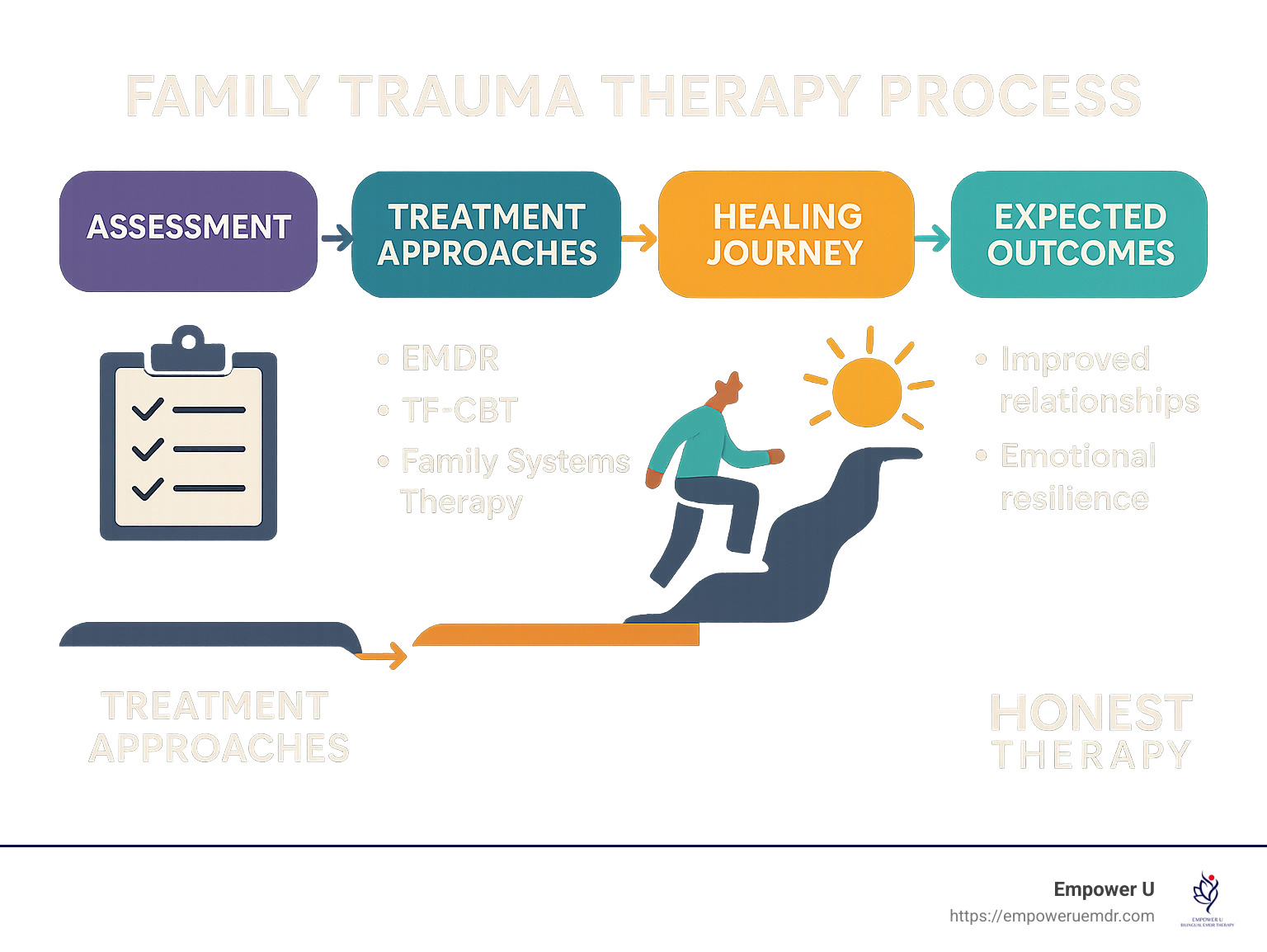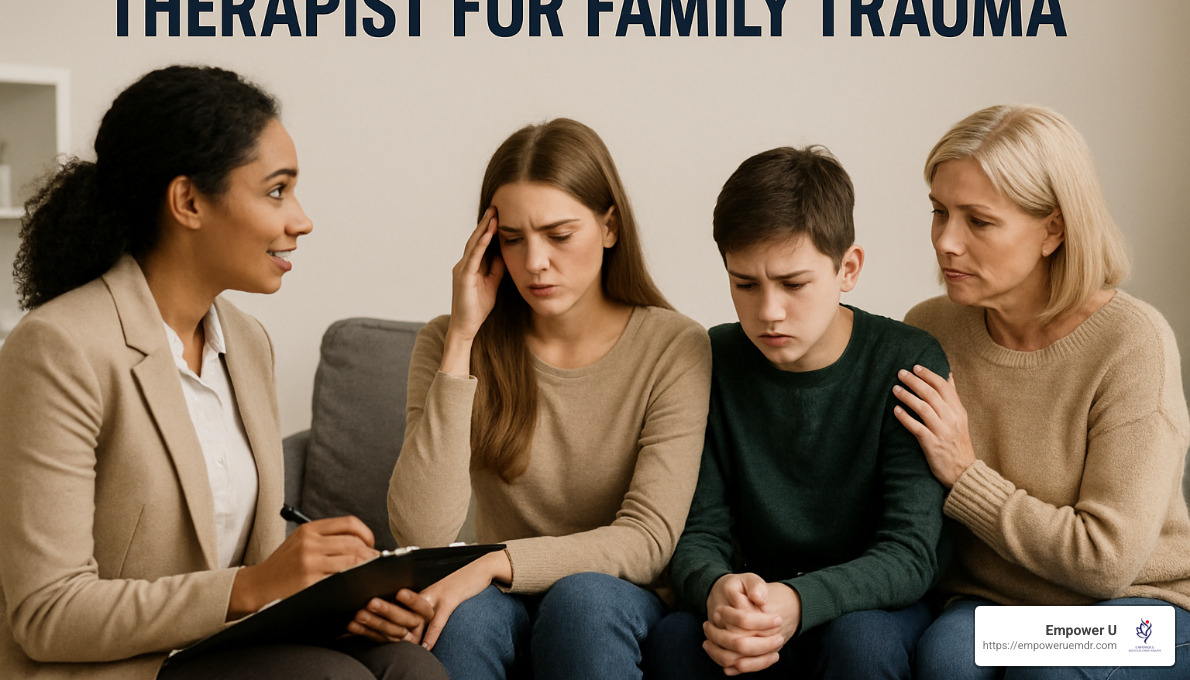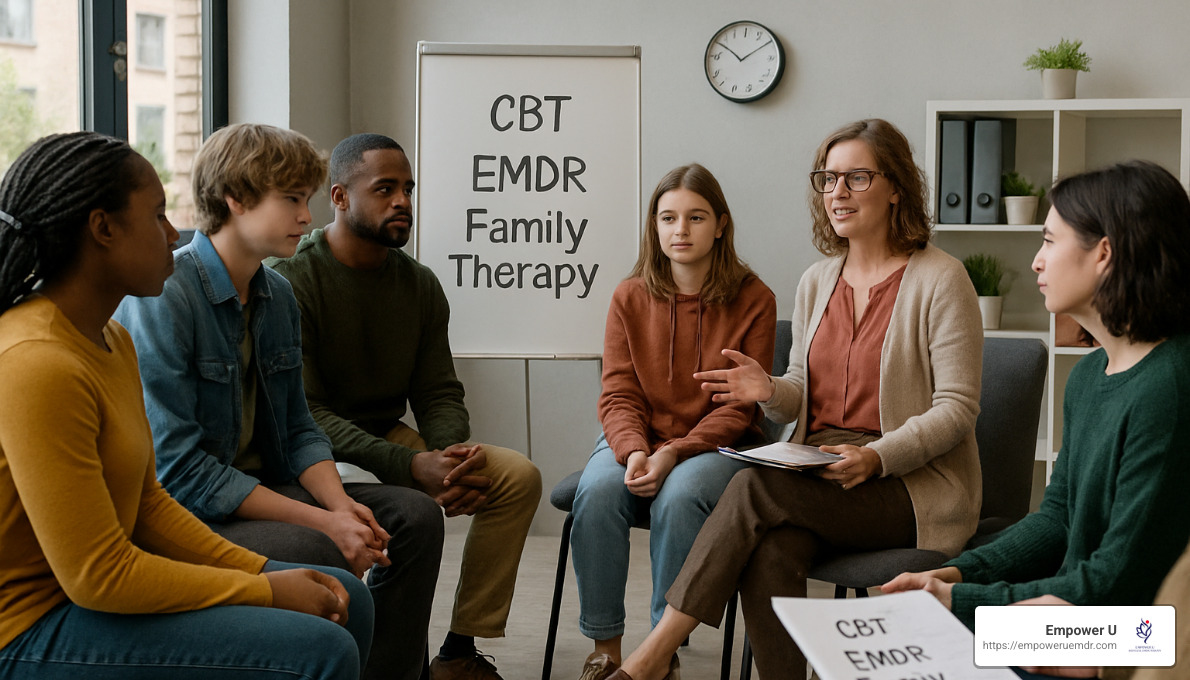Living Between Worlds: How EMDR Therapy Helps Bicultural Individuals Break Free From Anxiety & Self-Doubt

Do you ever feel caught between worlds—trying to honor your family's cultural heritage while also creating your own identity ? This struggle is common among adult children of immigrants or those who came to America at a young age. The pressure to balance different cultural expectations can lead to anxiety, self-doubt, and even depression when you feel like you're constantly falling short.
As a bicultural individual myself, I understand what it's like to question where you belong. My journey from engineering to becoming a bilingual therapist for family trauma grew from my own experience of reconnecting with my authentic self while navigating multiple cultural identities.
In this comprehensive guide, I'll explore how bicultural individuals can address the unique mental health challenges they face, and how specialized therapy approaches like EMDR at Empower U can help you break free from cycles of anxiety, guilt, and self-doubt to find your own authentic path.
The Hidden Struggle of Bicultural Identity
Living between two cultures creates a unique set of mental health issues that often go unrecognized:
Cultural Identity Confusion
Many bicultural individuals describe feeling like they don't fully belong anywhere—too "Americanized" for their family's culture, yet still seen as "different" in mainstream American settings. This creates persistent questions about identity: Who am I really? Where do I belong?
This identity confusion often leads to:
- Chronic indecisiveness
- Fear of making choices that disappoint family
- Difficulty setting personal goals that feel authentic
The Weight of Familial Expectations
For many immigrant families, success in America represents the culmination of tremendous sacrifice. This creates immense pressure on children to achieve and "make it worth it." But what happens when your dreams don't align with your family's expectations?
The sense of responsibility to fulfill parental dreams can be overwhelming. Making career choices that differ from family expectations often triggers intense guilt, shame, and anxiety. Even small decisions—from dating choices to weekend activities—can become sources of family tension and internal conflict.
The Cycle of Negative Self-Talk
When caught between cultural expectations, many bicultural individuals develop harsh inner critics with thoughts like:
- "I'm letting my family down"
- "I should be more grateful for their sacrifices"
- "I'm being selfish for wanting something different"
- "I'm not good enough in either world"
These thought patterns often trigger anxiety disorders and depression, creating cycles that are difficult to break without support. Over time, this negative self-talk becomes so familiar that you might not even recognize it as a problem—it simply becomes the background noise of your daily life.

How Trauma Shapes Bicultural Experiences
Many bicultural individuals don't realize that some of their struggles stem from experiences that can be understood through a trauma lens. While not all challenging experiences qualify as trauma, several common bicultural experiences can create traumatic stress disorder PTSD responses:
Migration Trauma
The process of migration itself—whether you experienced it directly or through your family's stories—can create trauma responses. Leaving behind familiar surroundings, extended family support networks, and cultural safety creates profound loss that may not be openly acknowledged or processed.
For those who came to America as children, the sudden immersion in an unfamiliar language and culture can be overwhelming to a young nervous system. These traumatic events often create adaptive responses that persist into adulthood—hypervigilance in social situations, people-pleasing tendencies, or emotional shutdown when feeling overwhelmed.
Natural disasters, war, or political instability in one's country of origin can also contribute to the traumatic experiences many immigrants face before or during migration. These experiences can compound the stress of cultural adaptation and create additional layers that need addressing in trauma therapy.
Cultural Disconnection as Attachment Disruption
When parents are struggling with their own adaptation or working multiple jobs to survive, their emotional availability to children can be compromised. This isn't anyone's fault, but it can create attachment disruptions that affect how you form relationships throughout life.
Cultural divides between generations can further complicate parent-child bonding. When parents don't understand your American experiences and you don't fully comprehend their cultural context, emotional connection becomes challenging. This disconnection can create a form of childhood trauma that shapes your adult relationships and self-concept.
Racial Trauma and Microaggressions
For many bicultural individuals, experiences of discrimination, racist comments, or being treated as a perpetual foreigner create cumulative stress. These experiences of "othering" contribute to anxiety and hypervigilance in social situations.
Even seemingly minor experiences like constantly being asked "Where are you really from?" or having your name mispronounced can create a sense of not belonging that impacts your sense of safety and worth. Over time, these microaggressions can lead to symptoms similar to post traumatic stress disorder in some individuals.
Signs You Might Be Struggling With Bicultural Identity Issues
While everyone's experience is unique, these common signs may indicate that bicultural stress is affecting your wellbeing:
Emotional Signs
- Persistent anxiety, especially in situations involving cultural identity
- Feelings of inadequacy or "not being enough" in either culture
- Guilt when making choices that differ from family expectations
- Mood changes when switching between cultural settings
- Depression or hopelessness about finding your authentic path
Behavioral Signs
- Avoiding family gatherings or cultural events
- Compartmentalizing your life between different cultural groups
- Perfectionism or overachieving to compensate for feeling "different"
- Difficulty making decisions without seeking family approval
- Switching between cultures to the point of feeling exhausted
Relational Signs
- Conflict with family about cultural values or expectations
- Difficulty forming deep connections in either cultural context
- Attracting relationships that recreate familiar cultural tensions
- Feeling misunderstood by people from both cultures
- Hiding parts of yourself from family or friends
Physical Signs
- Tension headaches or migraines during family conflicts
- Stomach issues when anticipating cultural situations
- Sleep disruptions when dealing with family expectations
- Fatigue from the constant energy of navigating different worlds
- Physical symptoms like chronic pain that intensify during cultural stress
If these signs resonate with you, know that you're not alone—and there are effective trauma therapy approaches to address these challenges.

How EMDR Therapy Helps Bicultural Individuals
Eye Movement Desensitization and Reprocessing (EMDR) therapy offers a powerful approach for bicultural individuals struggling with anxiety, self-doubt, and identity issues. As a certified trauma therapist who specializes in working with immigrants and adult children of immigrants, I've witnessed how this approach helps process difficult experiences and build confidence in bicultural identity.
What Makes EMDR Different?
EMDR therapy recognizes that our brains sometimes struggle to process difficult experiences, leaving them "stuck" in our nervous system. These unprocessed traumatic memories continue affecting our thoughts, emotions, and behaviors until they're properly integrated.
Unlike traditional talk therapy that focuses primarily on changing thoughts, eye movement desensitization and reprocessing works directly with how experiences are stored in the brain and body. This makes it particularly effective for addressing the complex emotions and bodily responses that cultural conflicts often trigger.
How EMDR Helps With Bicultural Challenges
For bicultural individuals, EMDR therapy can help in several key ways:
Processing Migration and Cultural Adjustment Experiences
Using bilateral stimulation (typically eye movements, taps, or tones), EMDR helps the brain process traumatic memories related to cultural adjustment, discrimination, or family conflict. This doesn't erase the memories but changes how they affect you emotionally.
Strengthening Positive Cultural Identity
EMDR therapy doesn't just address painful experiences—it also strengthens positive beliefs about yourself and your heritage. Through targeted protocols, we can reinforce your connection to cultural strengths and resources from both worlds.
Resolving Inner Conflicts Between Cultural Values
When values from different cultures clash, movement desensitization and reprocessing therapy helps process the resulting internal conflict. This creates space for you to thoughtfully choose which values feel authentic to you rather than automatically reacting from a place of guilt or obligation.
Addressing Relationship Patterns
Many bicultural individuals recreate familiar cultural dynamics in their relationships. EMDR helps identify and transform these patterns by processing their roots, allowing for healthier connections that honor your authentic needs.

The Therapy Journey for Bicultural Individuals
When you begin trauma therapy with me, we'll create a personalized approach that honors your unique cultural background and specific needs. Here's what the process typically includes:
1. Creating Cultural Safety
Our first priority is establishing a safe and supportive environment where all aspects of your cultural identity are welcome and understood. As someone who navigates multiple cultures myself, I understand the nuances of bicultural experience and won't ask you to constantly explain your cultural context.
Together, we'll explore what cultural safety means for you specifically, and I'll adapt my therapeutic approach to honor your unique cultural background. This might include using terms or concepts from your heritage culture when they better capture your experience than English words can.
2. Understanding Your Cultural Context
Before diving deep, we'll take time to develop a deeper understanding of the specific cultural dynamics shaping your experience. This includes:
- Your family's migration story and circumstances
- Cultural values emphasized in your family
- Expectations placed on you based on cultural norms
- Areas of cultural conflict you've experienced
- Your relationship with each culture you navigate
This contextual understanding ensures that therapy respects the complexity of your experience rather than imposing mainstream American values or solutions.
3. Building Coping Skills for Cultural Stress
Before processing difficult experiences, we'll develop practical tools to manage stress and regulate emotions. This might include:
- Grounding techniques for family gatherings
- Communication strategies for cross-cultural misunderstandings
- Mindfulness practices for navigating cultural transitions
- Boundary-setting approaches that respect family relationships
- Self-compassion practices for moments of cultural shame or guilt
These skills provide immediate relief while building a foundation for deeper healing work.
4. Processing Cultural Wounds with EMDR
When you're ready, we'll use trauma focused therapy like EMDR to address specific experiences that contribute to anxiety, self-doubt, or depression. Common targets include:
- Painful memories of being caught between cultures
- Experiences of family disappointment or conflict
- Instances of discrimination or microaggressions
- Times when you felt forced to reject aspects of yourself
- Key moments that shaped your beliefs about belonging
The EMDR process helps these traumatic experiences become integrated memories rather than active wounds that continue affecting your daily life.
5. Developing an Integrated Cultural Identity
As healing progresses, we'll focus on helping you develop an integrated sense of self that draws strengths from all aspects of your cultural identity. This includes:
- Identifying which cultural values feel authentic to you
- Exploring how to honor family connections while living your truth
- Developing confidence in your unique cultural expression
- Creating meaningful rituals that blend cultural elements
- Building relationships that support your integrated identity
This integration creates a sense of wholeness that allows you to navigate different contexts without feeling fragmented or inauthentic.
Practical Strategies for Bicultural Wellness
While therapy provides structured support for deeper healing, these practical strategies can help you navigate bicultural challenges in everyday life:
Navigating Family Relationships
Cultural Bridge Conversations
Initiate conversations with family members about cultural differences with curiosity rather than defensiveness. Try questions like:
- "What was most important to you growing up in [home country]?"
- "What has been most difficult about seeing me grow up in America?"
- "How can we honor our different perspectives while staying connected?"
These conversations build understanding and create space for compromise.
Selective Participation
Rather than completely rejecting or embracing all cultural traditions, thoughtfully choose which practices feel meaningful to you. This might mean participating in major holidays but adapting daily expectations to fit your values.
Translated Expression
Find ways to express your authentic needs using cultural frameworks your family understands. For example, framing personal choices in terms of family benefit or long-term stability might make them more acceptable while still honoring your needs.
Building Cultural Resilience
Bicultural Community Connections
Seek relationships with others who understand the bicultural experience. These connections provide validation and reduce the isolation many bicultural individuals feel. Look for:
- Cultural student associations or professional networks
- Online communities for bicultural individuals
- Local cultural events that attract diverse participants
Mindful Cultural Transitions
Pay attention to how you feel when moving between cultural contexts. Creating intentional transition rituals—even simple ones like taking three deep breaths or changing your clothes—can help your nervous system adjust.
Cultural Strength Identification
Make a list of strengths you've developed through your bicultural experience, such as:
- Adaptability and flexibility
- Perspective-taking and empathy
- Communication across differences
- Resilience through challenge
- Creative problem-solving
Regularly remind yourself of these strengths when feeling caught between worlds.
Managing Anxiety and Self-Doubt
Compassionate Cultural Awareness
Practice noticing without judgment when cultural triggers arise. Simply observing "I'm feeling the pressure to be perfect right now because that's what was expected in my family culture" creates space to respond differently.
Strategic Self-Talk Shifts
Identify common negative thoughts related to your cultural identity and develop compassionate alternatives:
Instead of: "I'm letting my family down by not following tradition." Try: "I'm finding my own path while still honoring what matters most from my heritage."
Instead of: "I don't belong anywhere." Try: "I'm creating a unique identity that draws from multiple cultural strengths."
Somatic Anchoring
Cultural stress often manifests physically. Practice noticing where you feel tension in your body when cultural conflicts arise, and develop simple physical practices (stretching, deep breathing, gentle movement) to release that tension. These somatic therapy techniques can help manage symptoms that arise from cultural stress.

When to Seek Professional Support
While self-help strategies can be valuable, working with a trauma informed therapist offers structured support for deeper healing. Consider seeking treatment if:
- You find yourself caught in persistent cycles of anxiety, guilt, or depression
- Cultural conflicts are significantly affecting your relationships
- You're making major life decisions and feeling overwhelmed by cultural pressures
- Negative self-talk related to your cultural identity has become severe
- You're experiencing PTSD symptoms that interfere with daily functioning
- You notice physical health problems that seem connected to emotional stress
- Previous attempts to address these issues haven't provided lasting relief
As a licensed therapist specializing in bicultural identity challenges, I provide a safe space to explore these complex issues and develop personalized strategies for healing.
The Path to Your Authentic Bicultural Self
Navigating multiple cultural identities comes with unique challenges, but it also offers profound strengths and possibilities. With the right trauma counseling support, you can move from feeling torn between worlds to creating an integrated identity that honors all aspects of who you are.
Through specialized approaches like eye movement desensitization reprocessing therapy, you can:
- Process difficult cultural experiences that contribute to anxiety and self-doubt
- Develop confidence in your unique cultural expression
- Create healthier relationships that respect your authentic needs
- Break free from guilt-driven decisions and perfectionism
- Discover the gifts your bicultural perspective brings to the world
My own journey from feeling culturally disconnected to embracing my bicultural identity informs my work with clients. Having navigated career changes, cultural expectations, and the complexity of raising American children while honoring my heritage, I understand the courage it takes to find your own path.
That wholeness is possible for you too. The bicultural experience doesn't have to be defined by conflict and anxiety—it can become a source of unique strength, perspective, and contribution.
I provide online therapy sessions throughout California, making it convenient to get the support you need from wherever you are within California. If you're ready to explore how trauma therapy can help you transform cultural challenges into strengths, I invite you to reach out.
Together, we can work toward a future where you feel empowered to live authentically across all aspects of your cultural identity—You don’t have to keep choosing between cultures or hiding parts of who you are. There’s a path to feeling whole, grounded, and in control of your life — with room to breathe, grow, and finally find peace.
Frequently Asked Questions About Bicultural Therapy
How is therapy for bicultural individuals different from general therapy?
Therapy for bicultural individuals requires specific understanding of how cultural contexts shape identity, family dynamics, and personal challenges. A trauma informed therapist who specializes in bicultural issues understands:
- The complex loyalty conflicts unique to immigrant families
- How cultural values influence emotional expression and help-seeking
- The impact of migration experiences on attachment and relationships
- How discrimination and othering create specific mental health conditions
- The importance of honoring cultural strengths while addressing traumatic experiences
This specialized understanding creates a therapeutic environment where you don't need to constantly educate your therapist about cultural basics or justify your experience.
Can EMDR therapy help with cultural identity issues if I haven't experienced "big T" trauma?
Absolutely. While EMDR was originally developed for significant traumatic events, it's now widely used for "small t" traumas—distressing experiences that don't meet the clinical threshold for PTSD but still impact your wellbeing.
For bicultural individuals, these might include:
- Persistent experiences of not belonging
- Chronic family tensions around cultural expectations
- Accumulated experiences of microaggressions or emotional abuse
- Ongoing internal conflicts between cultural values
EMDR effectively addresses these experiences by helping your brain process them in a way that reduces their emotional charge and allows for new perspectives.
How long does therapy typically take for bicultural identity challenges?
The therapy timeline varies based on individual factors including:
- The complexity of your cultural background and experiences
- Whether you're dealing with additional challenges like anxiety disorders or depression
- Your current support system and resources
- Your goals for therapy
Many clients begin experiencing meaningful relief within 8-12 sessions, particularly when using focused approaches like cognitive behavioral therapy or EMDR. However, deeper exploration of identity and long-standing patterns may benefit from longer-term work.
We'll regularly assess your progress and adjust our approach to ensure therapy remains beneficial and aligned with your goals.
How can I explain to my family that I'm seeking therapy without creating more conflict?
This common concern requires a thoughtful approach based on your specific family dynamics. Some strategies that have worked for other bicultural individuals include:
- Framing therapy in terms your family values, such as becoming more effective at work or building stronger relationships
- Explaining therapy as a form of education or skill development rather than "fixing problems"
- Sharing only what feels comfortable while maintaining appropriate boundaries
- Starting with phrases like "I've been learning about..." rather than directly announcing therapy
We can discuss personalized approaches for your situation, honoring your family relationships while supporting your healing journey.
Will therapy try to separate me from my cultural heritage?
Not at all. Culturally responsive trauma therapy recognizes that cultural connection is often a source of strength and identity. Rather than encouraging separation from your heritage, trauma therapy aims to help you develop a relationship with your culture that feels authentic and supportive of your wellbeing.
This might mean:
- Reconnecting with meaningful aspects of your heritage that have been lost
- Finding flexibility within cultural frameworks rather than rejecting them entirely
- Developing skills to navigate family expectations while honoring your own needs
- Creating new cultural expressions that blend elements from different worlds
The aim is integration that honors all aspects of who you are, not assimilation that requires rejecting your heritage.
What if my cultural background makes it difficult to talk openly about personal struggles?
Many cultural backgrounds emphasize privacy around personal matters or view seeking outside help as shameful. I understand these concerns and approach them with sensitivity by:
- Moving at a pace that feels comfortable for you
- Respecting cultural norms around disclosure and privacy
- Acknowledging the courage it takes to seek treatment
- Using approaches like EMDR that don't always require detailed verbal sharing
- Finding culturally congruent ways to discuss challenges
Together, we'll create an approach that respects your cultural background while still allowing for meaningful healing work.
About Cristina Deneve - Bilingual EMDR Therapist
My journey to becoming a therapist for family trauma began with my own experience of cultural transition and identity exploration. After switching careers from engineering to therapy, I discovered that my bicultural background was not a limitation but a strength that allowed me to connect deeply with others navigating similar paths.
As a bicultural immigrant in a biracial, bicultural marriage raising three American children, I understand firsthand the complex dynamics of living between worlds. This lived experience informs my therapeutic approach, helping me create a space where clients feel truly seen and understood.
My training in EMDR therapy, combined with expertise in Narrative Therapy, Cognitive Behavioral Therapy, Internal Family Systems, and Dialectical Behavior Therapy, allows me to tailor approaches to each client's unique needs. My Spanish fluency ensures that bilingual clients can express themselves in whichever language best captures their experience.
I don't see people as broken—I help them make sense of their struggles by looking at the bigger picture of their lives. By understanding current challenges within the context of cultural experiences, family patterns, and societal pressures, we can identify paths toward authentic living that honor all aspects of who you are.
My goal is to help clients heal, feel more at peace, more confident, improve their relationships, and feel empowered to live as their full, authentic selves—bridging worlds rather than feeling torn between them.
Begin Your Journey to Authentic Bicultural Living
If you're ready to transform cultural challenges into strengths and break free from cycles of anxiety, self-doubt, and guilt, I'm here to support your journey. As a bilingual trauma therapist specializing in bicultural identity issues, I offer a unique combination of professional expertise and personal understanding.
Online therapy sessions are available throughout California, making it convenient to receive culturally responsive care from wherever you are. To learn more about how we might work together or to schedule a consultation, I invite you to reach out through my website or contact me directly.
Your bicultural experience doesn't have to be defined by conflict and tension—it can become one of your greatest sources of strength, wisdom, and authentic connection. Through trauma focused therapy, we can address the underlying issues that create distress and help you build the life you truly want to live.

